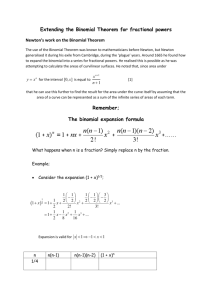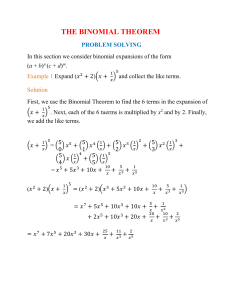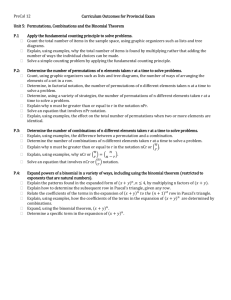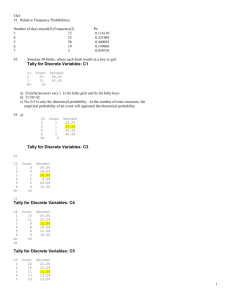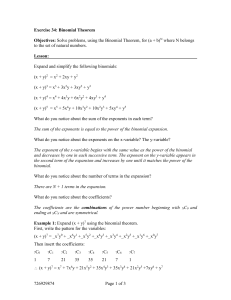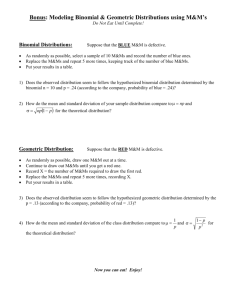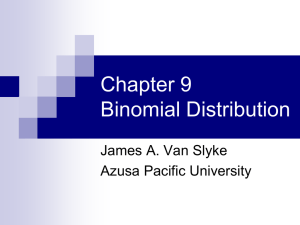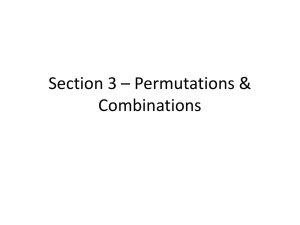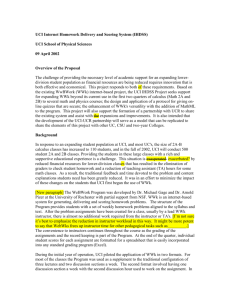File - Sarah douglas teaching portfolio
advertisement
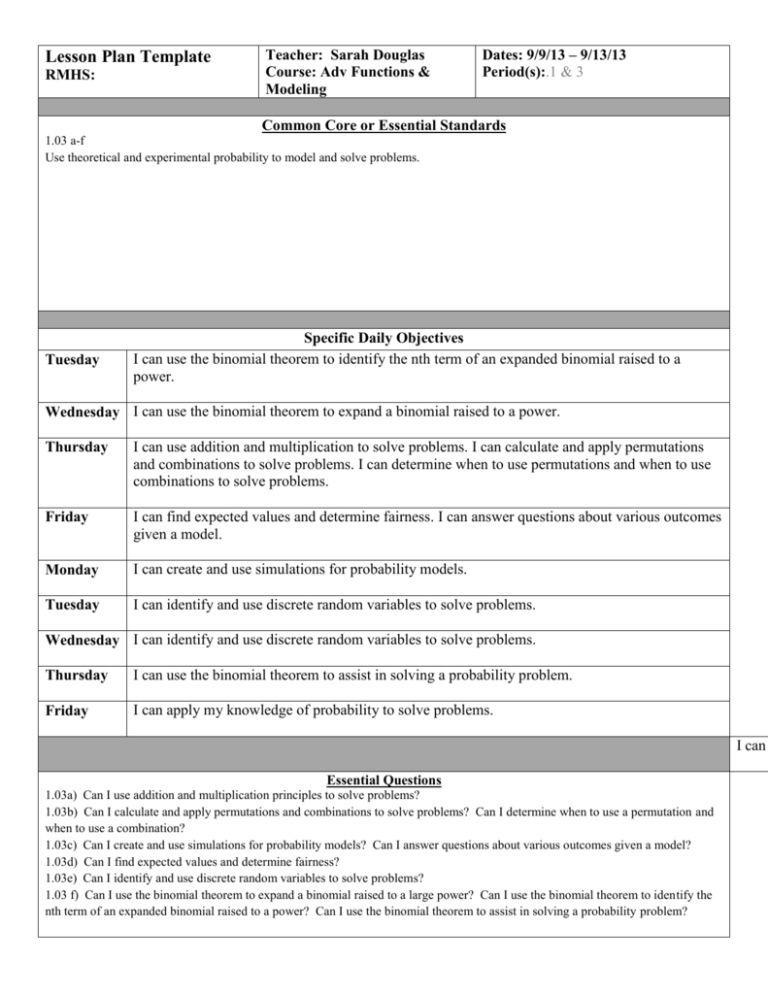
Lesson Plan Template RMHS: Teacher: Sarah Douglas Course: Adv Functions & Modeling Dates: 9/9/13 – 9/13/13 Period(s):.1 & 3 Common Core or Essential Standards 1.03 a-f Use theoretical and experimental probability to model and solve problems. Tuesday Specific Daily Objectives I can use the binomial theorem to identify the nth term of an expanded binomial raised to a power. Wednesday I can use the binomial theorem to expand a binomial raised to a power. Thursday I can use addition and multiplication to solve problems. I can calculate and apply permutations and combinations to solve problems. I can determine when to use permutations and when to use combinations to solve problems. Friday I can find expected values and determine fairness. I can answer questions about various outcomes given a model. Monday I can create and use simulations for probability models. Tuesday I can identify and use discrete random variables to solve problems. Wednesday I can identify and use discrete random variables to solve problems. Thursday I can use the binomial theorem to assist in solving a probability problem. Friday I can apply my knowledge of probability to solve problems. I can Essential Questions 1.03a) Can I use addition and multiplication principles to solve problems? 1.03b) Can I calculate and apply permutations and combinations to solve problems? Can I determine when to use a permutation and when to use a combination? 1.03c) Can I create and use simulations for probability models? Can I answer questions about various outcomes given a model? 1.03d) Can I find expected values and determine fairness? 1.03e) Can I identify and use discrete random variables to solve problems? 1.03 f) Can I use the binomial theorem to expand a binomial raised to a large power? Can I use the binomial theorem to identify the nth term of an expanded binomial raised to a power? Can I use the binomial theorem to assist in solving a probability problem? Tuesday Wednesday Activities, Strategies, and Tasks 1) WWK: Binomial Theorem, Pascal’s Triangle, Binomial Coefficient, Factorial 2) ISN Pg. 10 Binomial Theorem Opening Act to discover Pascal’s Triangle and it’s connection to binomial expansion 3) Patterns in Multiplication completed in groups 4) ISN Pg. 10 Apply Binomial Theorem to Expand (notes) 1) WWK: Addition Principle, Multiplication Principle 2) More Patterns in Multiplication 3) Part 3 – Find the nth term 4) ISN Pg. 9 You should be able to on Binomial Theorem Homework: ISN Pg. 12 Permutation/Combination Video and Cornell Notes Department Specific Checklist Make sense of problems and persevere in solving them Reason abstractly and quantitatively Construct viable arguments and critique the reasoning of others Model with mathematics Use appropriate tools strategically Attend to precision Look for and make use of structure Look for and express regularity in repeated reasoning Levels of Learning: BLOOM’S REVISED TAXONOMY Creating: Thursday Friday 1) WWK: Probability, Combination, Permutation 2) WS B2 Permutations and E2 Combinations on board to review video and introduce calculator directions 3) Simple Permutations and Combinations WS or Permutation vs Combinations Spreadsheet with choice of display 4) ISN Pg. 11 Venn Diagram on Fundamental Counting Theorem, Permutation, and Combination 1) WWK: Event, Experiment, Outcome, Theoretical Probability, Fairness, Expected Values, Sample Space 2) Exploration with Chance: Groups play 3 Fairness Games to explore fairness 3) ISN Pg. 13 Create a fair game with rules and procedures Combine, compile, compose, create, construct, design, develop, devise, formulate, generate, organize, plan, prepare, produce, write Evaluating: Argue, appraise, assess, critique, conclude, compare, defend, estimate, evaluate, judge, justify, predict, persuade, rate, support Analyzing: Analyze, attribute, break apart, categorize, compare, contrast, differentiate, dissect, distinguish, examine, organize, question Applying: Apply, choose, demonstrate, dramatize, execute, illustrate, implement, outline, role play, show, solve, use Monday 1) 2) 3) 4) WWK: Independent Event, Mutually Exclusive Events 45-minutes of literacy A lesson in probability via video; ISN Pg. 14 Cornell Notes Section 11.7 MyMathLab Understanding: Classify, compare, describe, discuss, explain, express, give examples, give main idea, infer, interpret, paraphrase, review, summarize, translate Remembering: Arrange, define, label, list, match, Tuesday 1) WWK: Discrete Random Variable, Frequency Table, Continuous Random Variable 2) Discrete Random Variable PPT with Cornell Notes ISN pg. 16 3) Ch4 Sect 4.1 WS practice 4) Special Discrete Probability Distribution WS memorize, name, order, recall, recognize, repeat, reproduce Wednesday Plan A: Binomial Theorem and Plan B: Frequency Tables & Discrete Random Variables based on students performs on the above topics. Thursday Friday Unit 4 Review 1) 2) 3) 4) Last minute questions Index card for test Unit 2 Test Unit 3 Pre-Assessment Access for All Visual Verbal Collaborative Group Work Scaffolding Graphic Organizers (“Thinking Maps”) Movement/Kinesthetic Audio/Video Future Ready Skills Effective Communicator Proficient Reader Literate Consumer of Media Creative/Innovative/Critical Thinker Curious Researcher Strong Team Contributor Knowledgeable Global Citizen Content: What was assessed Unit 2 Pre-Assessment on Probability Binomial Theorem Quiz Accommodations for EC / LEP / 504 students Small group instruction / assessment Extended time Modified assignments Read aloud Other: _______________________________ Other: _______________________________ Differentiation for individual students: Enrichment for advanced students: Extra practice/strategies for struggling students: Study Plans developed using MyMathLab ASSESSMENTS GIVEN Type Diagnostic Mid-point Cumulative Re-test Diagnostic Mid-point Class Average Above 80% 60% - 80% Below 60% Above 80% 60% - 80% Unit 2 Test Cumulative Re-test Diagnostic Mid-point Cumulative Re-test Reflection / Evaluation / Notes Below 60% Above 80% 60% - 80% Below 60%
